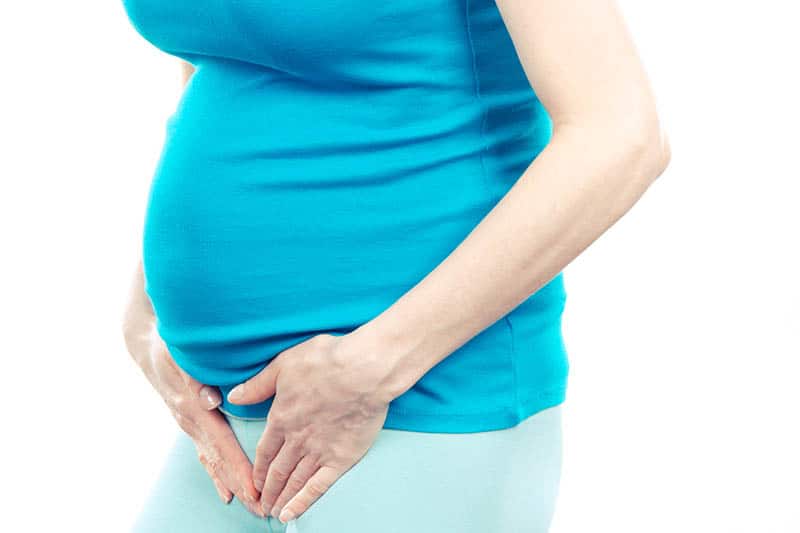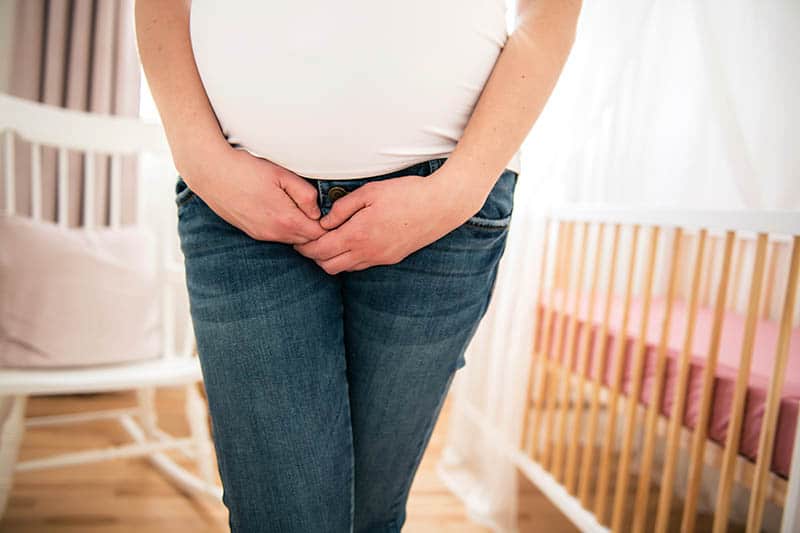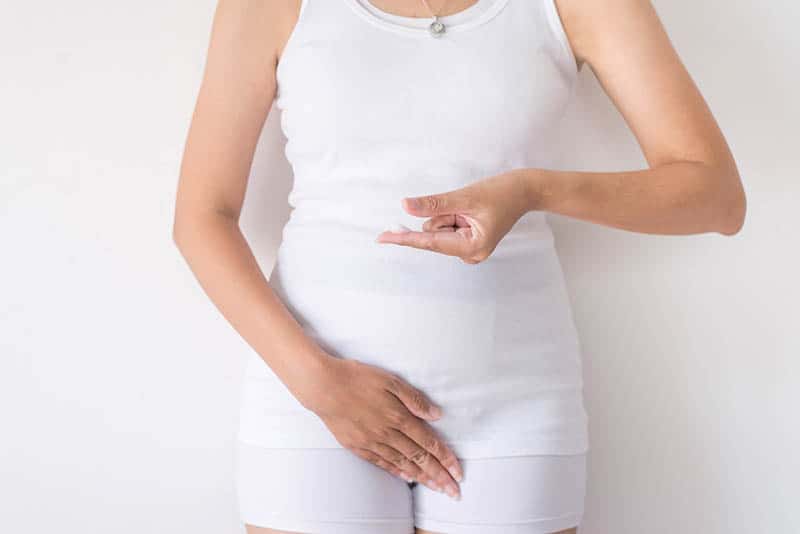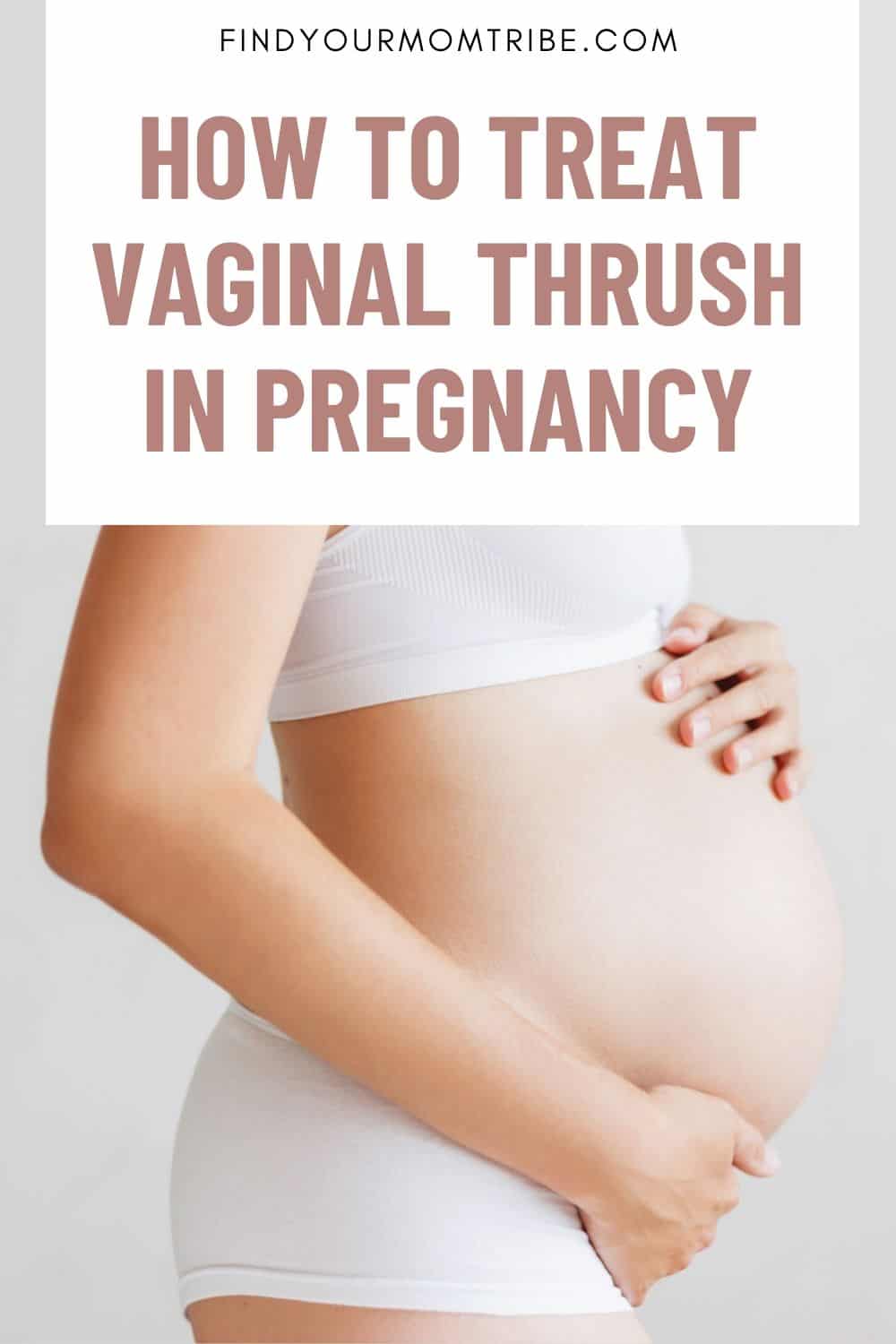Dealing with the symptoms of thrush in pregnancy can really put a damper on what should be a beautiful time of your life, especially if you’re approaching your due date.
Thrush is a yeast infection caused by Candida albicans, which is a fungus present in the vagina.
Due to hormonal changes, thrush in pregnancy is even more common than usual.
Thankfully, it’s just a yeast infection caused by a fungus that can be easily treated with over-the-counter medication!
Still, prevention is better than treatment, so I will also share plenty of tips with you on how to avoid recurring yeast infections, such as avoiding synthetic underwear and cutting back on sugar.
And remember – never start taking a treatment before getting the green light from your doctor, even if it’s over-the-counter!
What Are The Symptoms Of Thrush?

Here are some of the most common symptoms:
- Vaginal discharge – one of the first symptoms women get is a white or slightly yellow vaginal discharge that can also have a texture similar to cottage cheese. While it is uncomfortable, it doesn’t have an unpleasant smell. Although white discharge is common, sometimes it can even be slightly green in color.
- Burning sensation – Another very common symptom is itching and a burning sensation in the vagina and vulva.
- Redness – The area can become red, feel sore during intercourse, and urinating can become painful, too.
I should also note that this infection isn’t always vaginal, and can appear in the mouth, as well.
If you have oral thrush, you will notice white patches on the inside of your mouth.
Moms who breastfeed can also get nipple thrush, which can then be given to the baby and both mom and baby will need to be treated.
What Causes Thrush?

And when a woman is healthy, the balance of Candida and other bacteria in the vagina is kept under control.
But when the balance is disrupted, such as by a weakened immune system, the Candida can cause a yeast infection, which leads to many uncomfortable symptoms.
Unfortunately, thrush in pregnancy is extremely common, especially in the second and third trimester.
This is due to the numerous transformations your body goes through, including hormonal changes, which can disrupt the natural balance in your vagina.
Women who are more prone to getting thrush in pregnancy include those who are diagnosed with gestational diabetes or prescribed antibiotics to treat a bacterial infection.
If your diet includes lots of soda or food that is high in sugar (especially if your pregnancy cravings haven’t been too healthy), this can also cause an infection.
Considering that there are sexually transmitted diseases that have similar symptoms to thrush, your doctor might want to check whether you actually have thrush or another infection.
In this case, they will perform a swab test.
Treating Thrush In Pregnancy

And, since any medication you take could come into contact with your growing baby, it’s important to speak to a healthcare professional before you start treatment.
Even if you’ve used a particular medication before and responded well to it, it’s possible that it could be dangerous to use during your pregnancy.
While most women take over-the-counter medication to treat this fungal infection, some of them might not be safe to use by pregnant women.
Fluconazole, also known as Diflucan, is an antifungal medication that shouldn’t be taken when pregnant, and especially not during the first trimester as its use has been associated with miscarriage and birth defects.
Antifungal creams, however, are safe to use during pregnancy. Your doctor might prescribe Canesten (clotrimazole), which comes as a cream and a pessary.
The pessary is inserted into the vagina and most women see improvements within a few days.
Since the infection can be accompanied by itching, the cream can be applied to the area to get some quick relief.
Another possible treatment is Monistat (miconazole) which is sold under different treatment lengths, ranging from 1 day to 7 days.
It comes with vaginal suppositories and a cream to relieve any itching.
Most pessaries or vaginal suppositories are usually inserted with an applicator but since you’re pregnant, it’ll be more comfortable to insert them with a finger.
For convenience’s sake, it’s best to do this right before you go to bed.
If you want to wear a panty liner to help with the discharge, you can do so, but opt for brands that aren’t perfumed as this could further irritate the vaginal area.
Some women also find that probiotics, such as yogurt, help with the symptoms.
Regardless of which thrush treatment your doctor prescribes, make sure to take the full course, even if your symptoms get better or disappear.
Can it harm your unborn baby?
Staying healthy while carrying a growing baby is a priority for women, so experiencing thrush in pregnancy can cause a lot of anxiety over whether it could hurt the baby in any way.
Luckily, this infection can’t hurt your little one in any way, as long as you stick to the treatment prescribed by your doctor.
If you give birth while you have this infection, the baby will probably get it, too, but there’s nothing to fear as even babies can be treated.
How Can I Prevent Vaginal Thrush During Pregnancy?

- Avoid synthetic underwear
First off, you’re going to want to take a look at the kind of underwear you’re wearing and the material it’s made from.
Synthetic underwear is more likely to cause a yeast infection, so you should avoid wearing it for the time being.
Instead, wear cotton underwear and change it every day. Make sure that it’s not too tight and hand wash it using soap and hot water.
- Avoid tight clothing
While we’re on the topic of tight clothing, avoid wearing stockings, jeans, tights, or any item of clothing that could limit airflow and cause bacteria to grow too much, causing an infection.
If you’re able to (and if the weather permits), opt for loose-fitting clothing such as skirts or dresses, or even sweatpants. Also, dont forget about comfy pregnancy shoes!
At home, there’s no reason not to get totally comfy and just wear a robe and a pair of underwear.
- Change out of wet or sweaty clothes ASAP
I know that many moms-to-be love to exercise at least once a week and in this case, you should make sure to change out of your sweaty clothes the minute you get to the locker room.
The same goes for swimming – put on a clean and dry swimsuit after you come out of the water, as the dampness could lead to bacterial overgrowth.
- Don’t douche
A lot of women mistakenly think that using a douche could prevent infection as it “washes out” all the bacteria.
This is not true – your vagina is perfectly capable of keeping itself clean and douching will only make your infection worse.
Not to mention that douching disrupts the natural pH balance of your vagina and is not recommended by the American College of Obstetrics and Gynecology.
- Avoid shower gels
When showering, it’s best to wash the area with water only and skip shower gels to avoid more irritation.
And always wipe front to back!
- Don’t shave
If you are used to shaving your vaginal area, you’re going to want to avoid the razor for the time being – at least until the infection clears up since shaving can cause more irritation.
Not to mention that most women use some kind of shaving cream that can aggravate the symptoms.
- Boost your immune system
But preventing thrush doesn’t only depend on managing external factors, such as wearing cotton underwear. In fact, your diet plays an important role, as well.
Reduce the amount of sugary food in your diet and boost your immune system by incorporating healthy meals.
You can even look into what’s called a “candida diet” which can supposedly get the bacteria under control by eliminating certain foods.
- Stress less
Since stress can also have a negative impact on your immune system, try practicing yoga, mediation, gentle stretching or any kind of pregnancy workout to relieve tension and stress from your body.
To Wrap Up
Even though thrush in pregnancy is nothing to lose sleep over, any woman who has ever experienced it knows just how irritating the symptoms can be, so getting rid of it as quickly as possible is an absolute priority.
Luckily, there is no shortage of treatments that will bring you quick relief and help you get back to normal!
From topical treatments to suppositories, your doctor will help you determine which treatment is the best for you.
To prevent the infection from coming back, especially while you’re pregnant, it’s important to follow the simple tips I outlined above that will minimize the chances of thrush returning.
References:
“Vulvovaginal Health” published by the American College of Obstetricians and Gynecologists on the American College of Obstetricians and Gynecologists website in January 2020.
Like this post? Please share or pin it for later. You can also stay in the loop and follow us on Facebook, Instagram or Pinterest.

This post contains affiliate links. Please see our full disclosure for more info.

